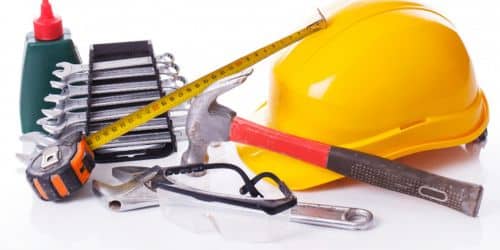Tools and equipment insurance is crucial to the success of tradespeople, professionals, or mechanics. The loss, damage, or theft of these items could have devastating consequences for your business if you are unable to complete the work you have scheduled. Insurance for tools can extend to both rented and owned implements. Trade tool insurance is important business insurance that they should always have
Tools Insurance
Tool insurance protects your trade or business from financial loss in the event of theft, vandalism, or other damage to its tools and equipment. This type of insurance is also sometimes called contractor’s tools and equipment insurance or equipment floater coverage.
Inland marine insurance, which includes tool and equipment coverage, protects goods while they are being transported over land. As a result, the items must be portable to qualify for coverage. This kind of inland marine insurance covers the cost of replacing or fixing items that are stolen, damaged, or vandalized. Additionally, these policies may include job completion coverage, which protects policyholders in case an insured event delays the completion of a job.
Objects worth less than $1,500 are called tools, while things worth more than that are called equipment. Insurance policies usually only cover things that are less than five years old, but some do cover older tools and equipment for their actual value.
Insurance for tools and equipment is not required, but some companies may ask to see proof of coverage before they hire you to protect their assets. A business owner’s policy, which combines property coverage with general liability insurance or commercial property insurance, can have tool insurance added as a rider.
Insurance for mechanics’ equipment can help pay for repairs after disasters, theft or vandalism on the job. Coverage for lost wages may also be available if replacing the tools is necessary to finish the project.
What Does Tools & Equipment Insurance Cover?
This insurance covers the costs of fixing or replacing tools and equipment owned by the business that mechanics, tradesmen, or contractors use, whether they own them, lease them, or rent them. In addition, Tools and Equipment Insurance covers them while they are in storage, being moved, or left at a client’s location. Equipment valued up to $10,000 is usually covered by tool insurance; anything over $5,000 requires scheduling.
The following are some of the things that most policies cover:
- Theft
- Fire
- Flooding
- Accidental damage
- Vandalism
This insurance typically protects the following types of tools:
- Hand Tools
- Power Tools
- Safety Gear
- Assisting Tools
- Measurement Devices
- Heavy construction equipment
- Bulldozer
- Excavator
- Backhoe
- Clothing and protective gear
How much is Tools & Equipment Insurance?
You can choose between policies with high deductibles and low premiums or policies with low deductibles and higher premiums. This is true for all types of insurance. Also, it is common for premiums to go up when you cover very expensive or specialized equipment.
Pricing for tools and equipment insurance starts at about $400 a year, but it could be higher or lower depending on your business’s specific needs. Annual tool insurance premiums are usually between $175 and $450, or $15 and $50 a month.
How much you spend on insurance for your tools and equipment will depend heavily on the specifics of your policy. The average cost of insurance for a business is between $15 and $50 per month, with higher premiums reserved for policies covering extremely expensive or specialized machinery.
The nature, value, location, and claim history are just a few of the factors that affect how much tools and equipment insurance will cost.
What does Tools Insurance not Cover?
In the event of a claim, Tools and Equipment Insurance will not pay for:
- Loss caused by normal use and age
- Negligence or loss not covered by insurance
- Used or outdated tools or machinery
- Intentional loss
- Mechanical breakdown
- Stationary equipment
- Rust and corrosion
- Mechanical faults
Who needs Tools & Equipment Insurance?
Construction companies and independent contractors alike need tools and equipment insurance to protect the tools and machinery they use on the job. Carpenters, tradesmen, mechanics, cleaners, construction contractors, electricians, landscapers, plumbers, painters, roofers, welders, etc. are some of the several types of businesses that can benefit from this coverage.
Additional Coverage Options
Tools and Equipment Insurance is usually an extra coverage that comes with a full contractor’s insurance policy. Additionally, the following insurance policies may be useful for contractors:
- Commercial General Liability Insurance
- Commercial Property Insurance
- Commercial Auto Insurance
- Builders Risk Insurance
- Pollution Liability Insurance
- Professional Liability Insurance
Scheduled vs Unscheduled items
These are the two groups of things you will be asked to list when you buy tool insurance. These are:
- Unscheduled items: Equipment and tools valued at less than $5,000 fall under the category of unscheduled items. You can provide an overall value for these things rather than listing each one separately but do so in your policy.
- Scheduled items: Scheduled items are expensive tools worth more than $5,000 that should be listed separately in your policy. Additionally, if you have more scheduled items, your premiums will be higher.
Per-Item vs Per-Occurrence Limit
The typical maximum limit for insurance coverage is $10,000. This is the highest annual payment your insurance policy will make. In addition, tool insurance has the following coverage limits:
- Per-item limit: This covers your policy’s unscheduled events and is usually set at $500 to $1,000.
- Per-occurrence limit: This is the most your insurance company will pay for a single event, also called an “occurrence.” It includes both scheduled and unscheduled events.
Actual Value vs Replacement Cost
Tools and equipment for contractors can be insured for either their actual cash value or their replacement cost.
When something is insured for its actual cash value, the policyholder receives funds equal to the item’s original value in the event of a total loss. This means that the insured amount is equal to the lesser of the original purchase price and the item’s depreciated value. The money from replacement value policies, on the other hand, is enough to buy a brand-new substitute for the lost or damaged item.
Comparatively, replacement value policies are more expensive than actual cash value policies. However, the added expense may be justified if your company owns several high-value pieces of equipment that have lost a considerable amount of value over the past few years.
Coinsurance
A coinsurance clause is standard on most policies covering tools and equipment. As a result, you need to have insurance that covers a certain percentage of the total value of the things you want to be covered. This is to guarantee that, should you need to file a claim, you have enough coverage.
Equipment coverage for its entire value is contingent upon the insurance company charging a coinsurance premium, which typically ranges from 80% to 100%. If you don’t, your insurance company may charge you a coinsurance fee, which means you have to pay a part of the cost. Additionally, if you buy insurance based on the item’s actual cash value, some companies may not enforce the clause.
Trade Tools Insurance
Tool insurance, also known as tool cover, is protection for the tools used in a particular trade. As a tradesperson, you know the importance of having high-quality equipment, and you may have spent a considerable amount of money on it. Trade Tools Insurance will pay for the cost of replacing or repairing your tools if they are lost or stolen while being carried in, loaded into, or removed from your car.
Since your tools are your primary means of income as a tradesperson, tool insurance coverage is crucial. You can not accomplish a single thing without them. It makes you feel good to know that if your tools get broken or stolen, you will not have to pay for a new set.
In the same way that other tradesman insurance protects your belongings, tools insurance keeps you from having to worry about what might happen if your tools get broken.
Best Tool Insurance
#1. The Hartford
Hartford gives small businesses a lot of different types of insurance, such as insurance for tools and equipment. Despite its reputation for financial stability, The Hartford scored lower than average in a recent J.D. Power survey on customer satisfaction. The NAIC reports that, relative to its size, The Hartford’s number of complaints is extremely low. In addition to its A+ rating from the BBB, The Hartford has earned high marks for financial stability and performance from Moody’s, AM Best, and Standard & Poor’s.
Its contractor equipment insurance policy will pay to replace any damaged or stolen tools or machinery as long as they are less than five years old. The policy covers tools and clothes left on the job site by employees up to $500 per item or $2,500 per event. It also covers items in transit, not just tools and clothes left on the job site.
The Hartford also protects equipment that is rented or borrowed from other people or businesses. To put it another way, the policy will cover any tools your company rents or borrows to get the job done. Your policy will also cover damage or theft if you rent or lend your equipment.
#2. NEXT
Next’s tools and equipment insurance covers contractors, landscapers, and janitors. It protects all tools and equipment used by the covered organization, regardless of whether they are their own or frequently rented. Additionally, the clothing and tools used by employees are covered.
As a supplement to its general liability insurance coverage, Next provides insurance for tools and equipment. This is helpful for companies that need both policies, but it can be a problem for companies that already have general liability insurance with another company. However, Next is a great choice for small contractors who need a full range of business insurance.
According to the NAIC, Next has a much lower rate of customer complaints relative to its size than the industry average. The company has an A rating with the BBB, which suggests it listens to and acts on customer complaints when they arise.
Next has received an A- (excellent) rating from the credit rating agency AM Best, and Munich Re, a major international insurance company, supports the business. Clients can rest assured that even though Next is a younger and smaller firm, it has sufficient resources to meet its financial obligations should a claim be filed.
#3. Chubb
Chubb provides extensive insurance for contractors’ tools and equipment. Contractor’s equipment insurance from Chubb is made for big companies with lots of equipment. In addition to its commercial property coverage, this policy also provides replacement cost valuations for covered property that is less than five years old.
Chubb’s policy automatically extends coverage to recently purchased equipment and covers a wide range of expenses that other policies do not. This covers cleaning up pollution, moving debris, and other costs related to recovery in the event of a covered incident. Tools and rented equipment used by employees are not covered by default but can be added as endorsements.
J.D. Power gave Chubb an 838 out of 1,000 score in a recent survey of customer satisfaction, making it the second-best company in the group being rated. A++ from AM Best, AA from Standard & Poor’s, and Aa3 from Moody’s all attest to Chubb’s solid financial standing.
#4. Liberty Mutual
The tools and equipment policies offered by Liberty Mutual are flexible enough to meet the needs of most companies. Liberty Mutual’s policies cover more than just the basics, including costly machinery and equipment, items rented or borrowed from third parties, income loss, and delays in project completion. Both replacement cost and actual cash value coverage options are available, and deductibles can be increased or decreased based on the type of coverage and the potential for loss.
Liberty Mutual has earned an A+ rating from the BBB for the quality of service they provide to their clients. However, the company’s 1.38 score on NAIC’s Complaint Index suggests that, compared to its market share, it gets a slightly higher number of complaints than other companies in the same industry. Still, Liberty Mutual gets good marks from rating agencies for how healthy its finances are. The company gets an A from AM Best and an A2 from Moody’s, which is the sixth best of 21 ratings. Additionally, Standard & Poor’s rates the business as “A.”
What Type of Insurance Covers Tools?
Tool insurance is a type of policy that covers the costs of fixing or replacing office tools and equipment that are lost, stolen, damaged, or vandalized. It is sometimes known as equipment floater coverage or contractor’s tools and equipment insurance.
Can You Get Insurance on Your Tools?
Yes. The contractor’s insurance only applies to purchases of less than $10,000 in tools and equipment made within the previous five years.
Is Tool Insurance Worth It?
Yes—you probably need certain tools and equipment for all of your projects. Even if you take all the right steps, something could still get broken, lost, or stolen. Protecting important tools with tool cover insurance is important to avoid having to buy new ones, which can be expensive, and delays in the project.
How do I Claim Stolen Tools?
If your tools get lost, stolen, or broken, you can file a claim with your insurance company. Get in touch with your insurance company right away after the event. Give them all the information they need, such as when and where the incident happened, what was lost or damaged, and anything else that is important.
If your claim is eligible for coverage under your policy, your insurance company will examine it. If your claim is accepted, you will need to show proof that you bought the things that were lost or damaged. It could be a receipt, a picture, or your bank statement. You can get up to the limit of your policy’s reimbursement from the insurance company for lost or damaged items.
What if my Tools are Stolen at Work?
Reporting theft to the police is very helpful because the officer will help you find your things. As soon as he locates the appropriate resources, he will use the report to corroborate your assertions. You should claim your insurance. Contact your insurance agent after filing the police report to let him know about the theft.
What is Equipment Floater Insurance?
An equipment floater protects your business property while it moves from one place to another with insurance. Any property that is moved, stored on-site, or located elsewhere for the duration of the project falls under this category.
Conclusion
As a tradesperson, you understand the significance of your equipment for your ability to earn a living. For this reason, protecting your tools with a solid insurance policy is crucial. Businesses and professionals who rely heavily on their tools can rest easy knowing they are protected financially by purchasing tool insurance.
- ELECTRONICS INSURANCE: Meaning, Coverage & Guide
- TOP 7 BEST INSURANCE FOR ELECTRICIANS 2023
- Equipment Breakdown Coverage: Definition, Coverage & Cost
- CONSTRUCTION INSURANCE: Definition, Types & More
- EQUIPMENT INSURANCE: What Is It & What Does It Cover?
- General Contractor Insurance: Coverage, Cost & More






